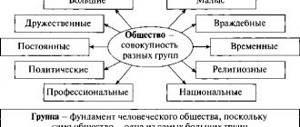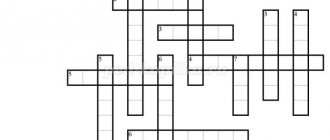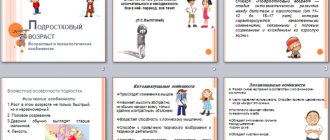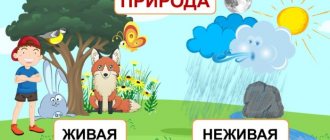- Reports and messages
- Miscellaneous
- Man, individual, personality
In the modern world there are many scientific disciplines that study man and society.
This is what biologists, philosophers, doctors, and psychologists do. Over the question “what is a person?” philosophers of Ancient China, India and Greece also thought about it. Many of them were sure that he was part of the cosmos, something that was settled on our planet on purpose, others were something divine, created by higher powers. Modern scientists are inclined to the theory according to which the origin of man is explained by his development. For example, Darwin argued that each of us is genetically related to the ape.
Man is the most developed part of living nature, existing in a social environment. Just like animals, he has a body and a brain, instincts, needs. But, unlike all animals, it can suppress these instincts, it is formed among people and does not imagine itself outside of society.
Who is the individual?
An individual in society is an individual. Each person is a representative of all humanity. He has certain characteristics - gender, age, needs for food, water, emotions. He will acquire some others when he learns to live among people.
Who can be called a person?
Personality is also an individual. Only now does this individual develop more significant traits. For example, it is important for an individual to achieve something in life; he has his own principles and norms of behavior. It is important for an individual to be part of society, but it is also important for him to be something significant in this society.
How is personality formed?
The formation of personality is influenced by family, school, friends and any other human environment. The family lays the foundation, shows and explains to the child what and how everything works around him. However, this does not mean that the child is always formed in the likeness of mom and dad. Remember Newton. He can certainly be called a famous person. But how many people know that the physicist’s parents were small farmers? This example shows that a person is capable of choosing his own path in life and achieving great success.
Is every person an individual?
No, not everyone. Man is born an individual. He, for example, has blue eyes and blond hair, his body is a small copy of the body of an adult. Throughout his life, he will gain experience and knowledge, learn to think and reason, and find a goal to strive for. And only after all this can our person be called a person.
Report Human personality
For many millennia, almost everyone has tried to answer the question: What kind of “person” am I, why was I born, what is my purpose. It is very important to try to know yourself, to find out what you are capable of, who you are.
When speaking about a person as an individual, very often what is meant is the social component of his essence. After all, as you know, a person combines both social and biological nature, but it is society that determines what degree of development as an individual.
There are three stages of development in a person's life - individual, individual and personality. It goes through the first stage at birth, until a person has acquired any habits, some special traits inherent only to him that distinguish him from the general number of people, he is simply a representative of the human race, he is an individual. When a person shows the main features of his temperament, reveals his dissimilarity, certain features of his appearance, he shows his individuality.
But personality is already a combination of social qualities that an individual has acquired in life and he demonstrates them through his behavior.
Each person reaches this level of development as a result of interaction with society. Personality qualities are not innate, but acquired as a result of development, skills. The more active a person’s development, the more clearly expressed in him are the traits that distinguish him as a person. The components of personality are: 1) knowledge, abilities, skills that he has accumulated as a result of life activities; 2) character, behavior, habits of a person; 3) worldview, self-awareness.
To develop the most important traits that shape a person as a person, the following are distinguished:
1) Education, which instills qualities in a person, helps to develop character.
2) Education, it provides the knowledge necessary for the formation and development of personality.
These two factors convey to a person the most important socialization experience that influences the development of personality. Each person is a unique individual, valuable to society, as an integral part of it. And how bright a personality will be depends on the qualities that a person develops in himself.
§ 1. Man – personality
Write down the selected numbers in the table under the corresponding letters.
| A | B | IN |
| 3 | 1 | 2 |
Advice. Tasks for correlating concepts and definitions are tasks of an increased level of complexity for the State Final Certification and the Unified State Exam. That is why you need to start working with them now.
In each row (column) three or four elements (provisions) are given, which need to be “correlated”, that is, to select a definition for each concept.
We advise you to first familiarize yourself with the contents of both series and identify the elements you know, and then think about the remaining provisions (elements). The answer is written in numbers under the corresponding letters.
3) Are the following statements about personality true?
A. Personality is formed in interaction with other people.
B. Personality is formed throughout a person’s life.
- Answer:
1) only A is correct
2) only B is correct
3) both judgments are correct
4) both judgments are incorrect
4) § 1 talks about the athlete Valery Brumel and the composer Ludwik van Beethoven. Do you consider them to be strong personalities? If so, why?
- Answer:
I believe that Valery Brumel and Ludwik van Beethoven had strong personalities because they moved inexorably towards their goal, despite external obstacles: severe trauma after an accident and deafness (and then blindness). Persistence, determination, the desire to overcome oneself for the sake of one’s favorite business are characteristics of a strong personality. After all, how many times could they break, like other people broke in similar situations? But no matter what, the heroes overcame all difficulties and left a huge mark on history.
5) Remember what books you have read in which the hero is a strong personality. Write the author and title of two or three books. What allows you to consider the characters in these books to be strong personalities?
- Answer:
Saburo Sakan "Samurai. Legendary pilot of the Imperial Japanese Navy. 1938 – 1945”, I really remember this memoir about a pilot who lost sight in one eye and was very seriously wounded, but at the same time, thanks to his training and perseverance, was able to shoot down several more enemies during the Second World War, and after it led a quiet, albeit difficult life in Japan.
I also like “The Tale of a Real Man” by Boris Polevoy, where the hero, also a pilot after losing his legs, returns to the sky and destroys his enemies. These actions are worthy of a strong personality who is ready to endure pain and suffer for the sake of his goal.
6) Choose a person who you consider to be a strong personality. Write a story plan about this person.
- Answer:
1.Childhood of A.P. Meresyev. Personal qualities
- War years, personality traits
The circumstances of the injury, the courage of the hero.
Life after leg amputation, a pilot on prosthetics.
Life after the war.
7) Fill out the table.
Answer:
Age and activity
| Age period | Primary activity |
| Childhood | Play activity |
| Adolescence | Educational activities |
| Adulthood | Labor activity |
Report No. 3
A person-person is someone who lives by his own rules. Personality originates from the words: “I myself.” On the part of the stronger sex, personality is a certain inner core, strength, will, confidence in one’s path. Such a person is only responsible for his actions in life. Not all people are given the opportunity to lead their lives as individuals. There is such a term as a human organism. The difference between the two types is that a person, as an individual, relies on his mind and soul. And the second option is more susceptible to outside beliefs and herd instinct. But this does not mean that a human organism is a crazy and soulless person, no. It’s just that this species uses these resources less often than an individual person.
For example, at some work, the difference between the two types may not be very noticeable. Because you need to think with your mind, but part of the will is replaced by work instructions and subordination. But when two people leave their jobs and begin to live in their own way, the difference becomes apparent. When a free person listens to something other than his own mind and will, then he fits the species - a human organism.
The main thing for a person is the mind and soul, that is, willpower. In order to do something, a person-person thinks, and then makes a decision. For example, all kinds of emotions and feelings for a person-person are something accompanying, auxiliary and nothing more than that. Each feeling can be strong or fade, but for the individual it does not matter, because the individual person is responsible for actions. The energy inside a person’s body is something he is looking for, but the person-person himself reproduces this energy. For example, the body always knows and understands what it wants. A person-personality analyzes and sees what he needs now and, moreover, reinforces this with desire and energy.
For a person as an individual, his values are very dear, which in turn take part in the formation of goals. Next, the goals help the individual form a plan, which puts the order of actions in order, then the person-person can only act, this is how such people achieve success. It may seem that feelings and emotions do not exist for such people, but this is wrong. Every feeling and emotion is tuned, formed, educated, from this it follows that it is not feelings that guide a person, but a person’s feelings. For a human individual, it is not interesting to perform small tasks; on the contrary, you need to fight for the fulfillment of high goals, which for a human organism are essentially impossible.
Man, individual, personality (relationship concept) 6th grade
Social studies lesson notes for 6th grade on the topic “Man is a Personality”
Man is a personality (2 hours).
Goals and objectives:
introduce students to the characteristic features inherent in a person, the meaning of his existence; give an idea of the essence of human duality; describe a strong personality.
Planned results:
students must learn to identify the personal and individual characteristics of a person; compare social objects, finding out their common features and differences; master the principles of working with a textbook, the text of which contains diagrams, additional text and questions, and also be able to conduct a discussion, heuristic conversation, work with documents, analyze problems, solve problematic problems, work in a group.
Formed UUD:
Subject:
apply the conceptual apparatus (man, personality, strong personality, individuality) to reveal the essence of human nature; be able to analyze, compare, study and systematize various historical and modern sources of information; find the necessary social information; understand the importance of society for the formation of personality and work activity for the individual and society;
Metasubject
– 1) communicative: accurately and competently express your thoughts, defend your point of view during the discussion, ask questions necessary to organize your own activities;
2) regulatory: independently discover and formulate an educational problem; search and highlight the necessary information;
3) cognitive: carry out an extensive search for information; analyze, compare, classify and summarize facts and phenomena; give definitions to concepts;
Personal:
focus on active and creative participation in public life, interest not only in personal success, but also in the development of various aspects of social life; analysis of one’s own actions from the point of view of human nature, responsibility for one’s decisions; development of creative abilities through active forms of activity.
Lesson type:
discovery of new knowledge.
Equipment:
textbook, multimedia presentation
During the classes:
1) organizational moment
2) motivational-target stage
— Listen to the parable and answer the questions.
One day Hing Shi was sitting on the shore of a small but very picturesque lake with one of his students. The air was filled with subtle aromas, the wind died down, and the mirror-like surface of the reservoir reflected everything around it with incredible clarity. The perfection of nature, its balance and purity gave rise to thoughts of harmony. Hing Shi turned to his student with a question: “Yang Li, tell me, when do you think there will be complete harmony in human relations?” The young and inquisitive Yang Lee thought and after a while, looking at the identity of the reflection of the landscape in the lake, he said: “It seems to me that harmony in relations between people will come only when all people come to a common opinion, think alike, become like a reflection of each other. Then there will be no disagreements or disputes.” And he sadly added: “But is this possible?” Hing Shi replied: “This is impossible, and it is not necessary. Indeed, in this case, there would not be harmony, but a complete depersonalization of a person, the loss of his inner “I”, individuality. People would become not so much a reflection as a shadow of each other.” After a short silence, the sage added: “Harmony in human relations will become possible only when each person strives not for unity of opinion or imitation of others, but for respect for the right of another person to express his individuality.”
Questions for the class
— How did you understand the meaning of this parable?
- What is she talking about?
Lesson topic: “Man is a personality.”
- What do you think we will talk about today?
- Open the textbook on p. 8 and answer the questions in the “Remember” section.
So, the lesson plan:
- What is personality?
- Individuality – good or bad.
- A strong personality - what is it?
3) Introduction to new material
Each of us has probably asked the question more than once: “Who am I? What am I? Why did I come into this world? What can I do for him? In the 21st century, people have solved more than one mystery that previously seemed unsolvable. But for a person himself there is no more interesting mystery than penetration into his own nature, knowledge of himself. For centuries people have asked themselves the question: “Who are we and what are we like?” - and could not answer it.
The ancient poet Sophocles wrote:
There are many miracles in the world,
The man is the most wonderful of them all.
4) Work on the topic of the lesson
1. What is personality (1 hour)
When we use the concept “man,” we mean a representative of the human race, a unique creation of nature, possessing a number of common properties.
- Remember what the dual essence of man is?
(biological and social)
Man is the greatest mystery of the universe, which all great philosophers have been struggling to uncover for several millennia. Man is a highly developed living being belonging to the biological species Homo Sapiens (Homo sapiens). Like any organism, a person has sense organs, circulatory, muscular, skeletal, nervous and other systems. However, its natural qualities manifest themselves in more complex interactions.
The ancient Greeks, who created the cult of the human body, admired the special biological organization of man.
In the 19th century, Darwin proved that man represents the pinnacle of the evolutionary development of nature and differs from other animals in exceptional biological perfection. This position was expressed in very famous words: “Man is the crown of nature.”
As a higher mental being, man has reason. However, the human mind reveals itself both in creative creation, social mutual assistance, and in the violent conquest of nature, the malicious destruction of millions of people. Consequently, if man, thanks to reason, has separated himself from the animal world, he must constantly confirm the status of a rational being, called upon to preserve and transform life on Earth.
Exercise:
Thus, we see that man is a biosocial being.
Now your task is to create a diagram in your notebook:
Option 1 – writes biological traits and characteristics of a person, Option 2 – social traits and characteristics of a person
Human:
- biological being - part of living nature; an organism that lives according to biological laws
- a social being endowed with reason who: is capable of reflection; solve the most complex problems; can fully develop only in a society of its own kind.
We are convinced that without a society of his own kind, a person cannot develop successfully. Therefore, scientists distinguish two stages in human development:
- children's society - family and school (play, work, learning)
- adult society – family, work (study, work)
we see that in the course of his development a person becomes a personality.
- What is personality? What image do you have when you hear the word “personality”?
Personality is a set of human qualities that appear:
In the process of living in society,
As a result of activities,
In the process of communicating with other people
Only personality has consciousness!
Consciousness is a person’s attitude to the world and an understanding of what a person does, how he lives, what he dreams of.
Consciousness gives a person the opportunity to engage in various activities, communicate with other people, evaluate others and himself.
(diagram on slide)
Task:
open p.
9, read and write down the answers to the questions in your notebook: 1) From what time does a person become a person?
When he begins to understand himself; with the separation of one’s self from other people; with the emergence of individuality; every person is an individual, but the degree of respect for this individual varies
2) Are all the people around us individuals?
Whether a person is respected or not can be determined by how a person works (studies, plays); relates to the surrounding world; evaluates himself
3) Write down the main personality characteristics.
Ability to work; purposefulness, will, diligence, perseverance, the ability to overcome difficulties, and be critical of your successes.
Homework
1) Read paragraph 1, p. 8-9, answer the questions after paragraph 1.2 (test yourself), task 1 (in class and at home)
2) Answer the questions in the “Let’s Discuss Together” section
3) Read the statement of the ancient Roman philosopher Seneca and explain its meaning: “The soul cannot be one color, and the mind cannot be another. If the soul is healthy, if it is calm, sedate and self-controlled, then the mind will be clear..."
4) Based on the text of the textbook and your own experience, evaluate what qualities for successful work are well developed in you? What else needs work? What personality traits are especially attractive to you, and which ones would you like to develop in yourself?
(orally)
Lesson 2 (1 hour) - continuation
1)
checking homework (orally)
2) working on the topic of the lesson (continued)
2. Individuality – good or bad
Assignment: turn to the art gallery section on p. 10-11 textbook. Before you are two portraits of girls. Make up verbal descriptions of the girls. Use the words for this: thoughtful, dreamy, active, sad, cheerful, smiling.
— Is it possible to determine character traits and behavioral traits by their appearance?
People have common features: a certain body structure, the ability to think, speak and much more, but at the same time, each of us has our own distinctive characteristics.
- one at a time at the board: guess what common features make up individuality? What associations and thoughts come to your mind when you hear the word individuality? (result – diagram on the slide)
Individuality:
- habits (snapping fingers, chewing pens, etc.)
- appearance (face, hair, physique)
- culture
- race
- temperament (sanguine, choleric, melancholic, phlegmatic)
- creativity, etc.
Every person is unique, and that's wonderful. Now let’s look at what forms this uniqueness, and what factors exist that shape a person’s individuality.
A person’s individuality is formed under the influence of three groups of factors:
- heredity and physiological characteristics (appearance, eye color, nose shape, body structure)
- factors stemming from a person’s environment (as a result of interaction with family, friends, school)
- traits and characteristics of a person’s character (as a result of personal self-development)
A person receives some individual personality traits by inheritance, while others are acquired by communicating with parents and friends.
- task for discussion - imagine that we came to a discussion club where there is a problematic question - is individuality good or bad? The first option is arguments in defense of individuality, the second option is arguments against individuality. Whoever wins in this discussion - the most active ones will receive A's, others - nothing. For help - from 12-13 textbook.
3) a strong personality – what is it like?
The concept of “strong personality” is usually used to characterize a strong-willed person who is able to express his own opinion and achieve a lot by setting a goal.
- Let’s turn to the section “Once upon a time there lived a man” on page 15. Read aloud and answer the questions:
— Can Beethoven be called a strong personality? Why?
- this was an example of a world-famous personality. Now read the story about the boy Misha on p. 15, second paragraph. Can Misha be considered a strong personality?
Fear is inherent in every person. But a strong person differs from a weak one in that he can overcome his fear. (tell them about your fears and ask them what they are afraid of)
Our last task for today is to create a portrait of a strong personality. Additional material will help us. Distribute material about Nick Vujicic and, based on the textbook, create a portrait of a strong personality and check it together.
The result is a strong personality:
- thinks first of all about the interests of the business. Which he deals with, giving it paramount importance, and only then - about his personal life, family, recreation, etc.
- strives for heights that no one has conquered before
- has self-confidence and self-confidence, initiative
- has high moral qualities and takes responsibility
- has a creative streak
- realizes his capabilities and strives to expand them
- does not respect authorities, strives to do everything his own way
If you have time, read the statements and determine what unites them.
“It’s easy to mix with the crowd, but it’s hard to be yourself in it!” (group “Epidemic”, Time of Choice)
“Don't imitate others. Find yourself and remain yourself, because “envy is ignorance” and “imitation is suicide”” (Dale Carnegie)
“The smarter a person is, the more originality he sees in everyone with whom he communicates. For an ordinary person, all people look the same” (Blaise Pascal)
4) homework
1) Read paragraph 1, p. 12-15, answer the questions after paragraph 3.4 (test yourself), task 2-3 (in class and at home)
2) Look at the picture on p. 14 textbooks, orally answer questions about the picture
3) Assignments from the workbook in writing (on separate pieces of paper)
Additional material for the lesson.
Nick Vujicic - anything is possible
“Nick Vujicic was born in Australia in 1982 into the family of a nurse and a priest without arms or legs. Imagine, he couldn’t do anything on his own; his family and friends had to look after him 24 hours a day. Nick's childhood was very difficult both physically and psychologically, because he had almost no friends, and there was constant ridicule around him. However, the young man managed to get a higher education, now he does everything on his own and even... swims! And his typing speed on a computer is 43 words per minute. But this is just the tip of the iceberg. He was ahead of many physically able people, conducts seminars all over the world and helps people like him, disabled people and people who have problems, begin to appreciate life, fight and move forward. It would seem that a man without arms and without legs, but inspires ordinary people: to live without giving up, to live for loved ones. Each of us has something to learn from him.”
Workbook assignments for homework after second lesson
1) Read the text.
“When, forty years later, you leaf through the secret “Diary” of your youth, you are often amazed - there you find a person whose existence you had already forgotten. He seems completely alien... I see in front of me a strange boy who bears my name and looks like - no, not like me (I don’t recognize myself in him!), but like someone else, familiar to me... Who is he?”
Romain Rolland
- What is the main idea of the text? Try to formulate it in one sentence.
- Why does the author ask the question “Who is he?”
2) Each person has individuality, has unique, unique features. Think and write, where does your individuality manifest itself?
Popular message topics
- Lake of Russia
Who knows how many lakes there are in Russia? Probably no one will answer for sure. There is a figure and it is about 2 million lakes, which is impressive. It is possible to list only the largest and most famous lakes. - Why do people get scurvy?
Scurvy is a very terrible and life-threatening disease. A person can die from this disease. Until the 20th century, doctors around the world could not find a cure for this terrible disease. A large number of people died from it every year. - City of Sochi
The city of Sochi, its beauty is sung in songs, is a truly amazing city that has its own specific characteristics. Sochi is the most popular and beautiful resort city in Russia. It is located in a wonderful place, on the shores of the Black Sea.





